How to feed a newborn kitten?
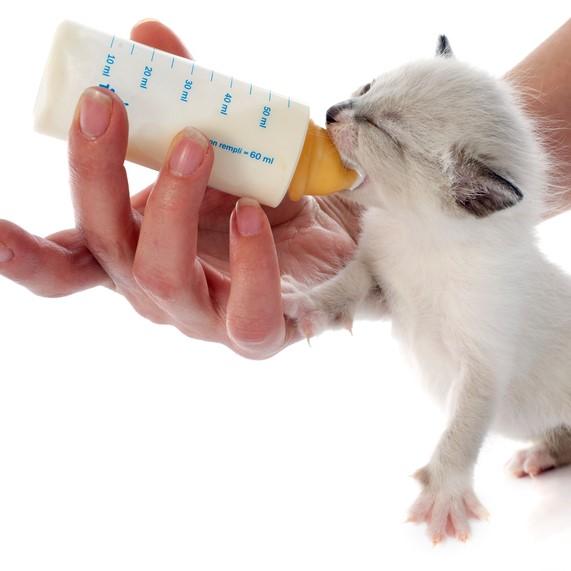
A kitten must stay with her mother and drink her milk until 8 weeks after birth, including 10 weeks, before being adopted: nothing replaces her mother to give her the nutrients she needs and the care that will allow her to have the best socialization and a good development of your immune system. It is recommended to leave the kitten with his mother until your 12 weeks before its adoption.
But you must watch the kittens and control that they grow and gain weight at an appropriate rate: it may not be the case and you would have to take care of your diet.
If the mother has died or if you have found a orphan kitten you are going to have to feed him, keep reading this article to know how to feed a newborn cat.
The water needs of kittens with their mother
If the kittens have their mother, she is the one in charge of feeding them: they should breastfeed at least until the 8 weeks.
Normally all water needs must be covered in full by the breastmilk during the first weeks. Any factor that prevents breastfeeding will lead to rapid dehydration. So you should make sure that all kittens suck properly, especially in the case of numerous litters, you should also check that they gain weight properly.
La moisture Environment is a parameter that you must control: the hygrometry must be between 55-65%, especially when the kittens are away from the mother. For this you can simply place some bowls with water near the nest to keep the oral and respiratory mucous membranes hydrated.
If the hygrometry falls below 35% the risk of humidity is very important.
Hygrometry should also not exceed 95% because this could cause respiratory distress, and moreover, micro-organisms develop more easily in a very humid environment. But in case of weak or premature kittens it may be interesting to maintain a hygrometry of 85-90%: this decreases the water losses by evaporation at the level of the mucous membranes and decreases the heat losses.
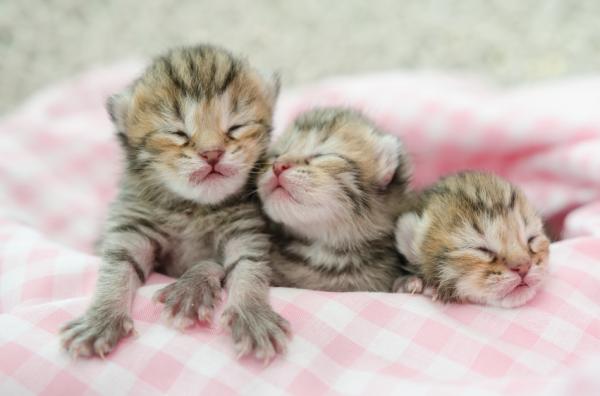
Signs of underfeeding in the newborn kitten
A kitten in good health sleep between his milk and wakes up when his mother stimulates him and then starts screaming and actively seeks the teat.
When your meals are insufficient the cats wake up more frequently and moan. Gradually they become inactive and do not gain enough weight. The most frequent complications due to malnutrition are diarrhea, dehydration, hypoglycemia and hypothermia.
All kittens sub-fed or rejected by their mother should be assisted quickly.
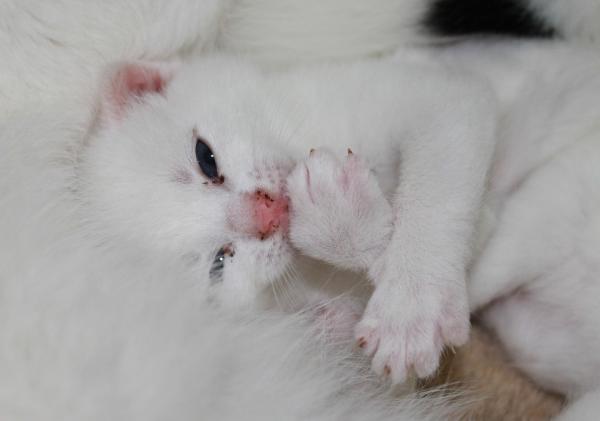
Weigh the kittens
Birth weight is an important diagnostic factor: it is established that a low birth weight is correlated with the severity of newborn diseases. A study shows that 59% of dead-born or dead cats a few days after birth had a low birth weight.
If the cat received an inadequate diet for its physiological state during pregnancy, the weight of the kittens may be affected.
Kittens with a birth weight under they have a higher metabolism and higher energy needs: they are more predisposed to hypoglycemia.
To conserve the data, we recommend that you write down the weight of the kittens every day, at least during the first 2 weeks.
El normal birth weight of a kitten is between 90 – 110 grams, and you must earn about 15 – 30 grams every day during the first month (in any case at least 7 – 10 daily grams) and you must have reached double your birth weight at the age of 14 days: your weight goes up by 50 to 100 grams per week. Whether male or female does not influence their weight gain in the first weeks.
A weight loss can be acceptable if it does not exceed the daily 10% and if it affects only a limited number of kittens. However, if the entire litter loses weight, the cause should be found quickly.
If the weight of a kitten decreases each day, the food is probably insufficient or of poor quality: a complete examination of the mother should be performed in search of a mastitis, a metritis or another condition that has a harmful influence on the production milk.
A kitten that loses weight during 24 to 48 hours or that stops gaining weight during 2 or 3 days must obligatorily receive a food supplement, the results are more favorable if it is intervened at the beginning of the weight loss.
Relationship between the age and weight of a growing kitten from birth to 8 weeks:
- Birth: 90 – 110 grams
- 1ª week: 140 – 200 grams
- 2ª week: 180 – 300 grams
- 3ª week: 250 – 380 grams
- 4ª week: 260 – 440 grams
- 5ª week: 280 – 530 grams
- 6ª week: 320 – 600 grams
- 7ª week: 350 – 700 grams
- 8ª week: 400 – 800 grams
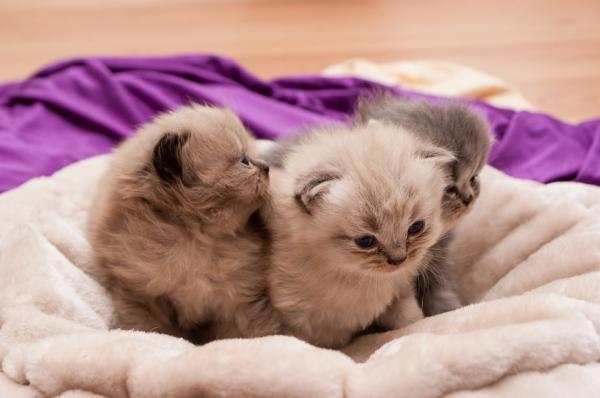
For orphaned or underfed kittens: breastfeeding
Artificial milk
Artificial milk should be a food that best covers the needs of kittens. The energy requirements of the kitten are estimated at 21 – 26 kcal by 100 grams of body weight.
A kitten that had a mother would receive the colostrum in its first hours of life: it serves not only to give nutrients to the kitten but also to give it immune defenses passive transmitting immunoglobulins. Therefore, for the first years of life, a substitute must be found that fulfills the same functions as colostrum. Colostrum is produced by the cat physiologically during the first 24 to 72 lactation hours, then produces milk.
Distribution rhythm
The number of recommended food each day for a kitten is difficult to discern. Effectively, kittens tend to absorb milk in small quantities but in many doses: up to 20 per day. The rate of distribution of the replacement feed should be regular, without exceeding 6 hours between two shots.
But you should leave enough time for the stomach to empty: a few 3-4 hours and respect as much as possible the rhythm of the kitten. Effectively awakening it too often could cause stress. We recommend some 4 to 8 daily shots, separating them some 3-6 hours.
Generally, although conditions are favorable and lacto-replacing good, kittens fed with artificial lactation tend to have a growth retardation. This delay must not exceed 10% and must be compensated during weaning.
The stomach capacity of a newborn is about 50mL / kg, usually a kitten only absorbs a few 10-20 ml for milk intake, so the concentration of lacto-replacer is essential to meet the needs of kittens.
If the energy density of the lacto-replacer is too low we will have to increase the number of intakes. In this case to cover the nutritional needs we will create an excess of fluid that can affect the water balance and damage the kidney. On the other hand, if the dairy substitute is too energetic or if we give too much to the kitten, it may have osmotic diarrhea or other digestive disorders.
The natural composition of the cat’s milk changes after 72 hours after delivery and goes on to produce milk itself instead of colostrum. The milk will be the only food contribution of the kitten until weaning. You can use, for example, TVM infant formula.
La milk should be prepared just before administering it to kittens and should be distributed to kittens in sterile syringes and nipples, it is also better that each kitten has its own teat cup. It is advisable not to prepare the milk in advance but if you had to do it, you should keep it in the fridge at a maximum temperature of 4 ° C, and never more than 48 hours. The milk should be given to a Temperature of 37-38 ° C, it is better to heat it in the water bath because if you heat it to the microwave it will form very hot bubbles of liquid and other very cold ones.
When cats accept to suck the bottle is the ideal solution: so the kitten stops sucking when he has ingested enough milk. But the kitten must have a suction reflex to be able to feed it with the bottle, otherwise it could cause swallowing problems.
The syringes are more appropriate for kittens less than 4 weeks because the bottle nipples are often too big for them or they have too large a liquid discharge.
Kittens between 1 to 3 weeks need two large scoops for 110 grams of live weight each 2 to 3 hours.
To feed the kitten, place it in the same position he would have if his mother gave him milk: the head raised and the belly in a towel, let it suck until the satiety but do not give it too much quantity. You should be calm when you feed him to feel confident, and let him take his time to suck to avoid digestion problems or eat too much food.
Once you have finished breastfeeding, keep the kitten lying on its back and gently caress its belly: if it were with its mother, it would lick its belly or genital area to stimulate it. empty your intestines in solid or gaseous form. This step is very important.
Then reposition the kitten in its nest so that it huddles and rests, continues to feed it until the time comes to start weaning and progressively introduce another type of food.
Usually begins to add I think to the 4 weeks But some cats feed exclusively on milk until 8 weeks, so you should consult a veterinarian to determine the ideal time of weaning and meet the needs of your kitten.
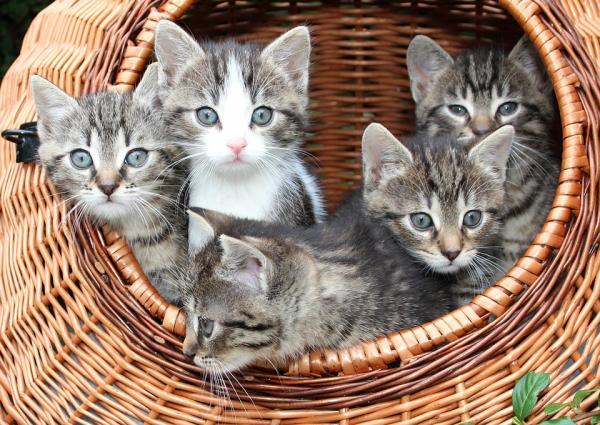
If you want to read more articles similar to How to feed a newborn kitten?, we recommend that you enter in our Breastfeeding section.


